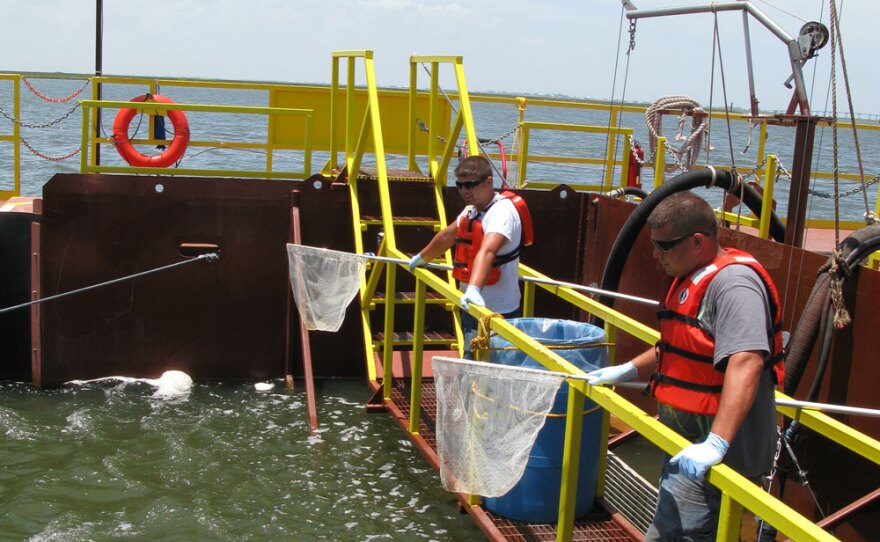Tar balls showed up in Lake Pontchartrain recently -- a shock to local officials who were initially told they wouldn't be as vulnerable to the leaking oil as coastal areas closer to the Gulf. But almost three months after the oil started leaking, St. Tammany Parish finds itself on the front lines of cleanup efforts.
The parish is on the north shore of New Orleans, where officials are getting creative with their defenses against the oil. But some officials worry about the long-term consequences of such expensive projects.

Out on Lake Pontchartrain, a row of barges is stacked up at the entrance of one pass to try to stop the oil. But the real action is farther out in the Rigolets Pass, a narrow waterway that connects the lake to the Gulf of Mexico. Here, there's a local experiment in skimming that works in deep and shallow water.
The Experiments
Two fishing boats trail lines of bright orange boom behind them. That boom is funneled back to a barge behind the boats in a sort of V shape.
"So the oil comes in, is funneled in with the boom with the shrimp boats. It gets into this area. There is a pan underwater that keeps it contained," says Bobby Phillips of K and K Construction and Disaster Services.
Onboard the barge, half a dozen crewmen scan the water for signs of oil. It's sweltering as the intense sun reflects off the metal barge and off the water.
Kinte Walker from Picayune, Miss., used to work on boats that supplied oil rigs in the Gulf, but he was laid off. Now he and three others hold fishing nets on long poles and gaze into the water for hours and hours.
Walker says tar balls have been floating up for the past several days.
"Some [are the] size of a baseball. Some [are the] size of half a dollar and some [are the] size of a silver dime. And I use this net and we just -- as we see 'em coming, we just pick 'em up," Walker says.
But on Monday, the crew didn't find any oil.
This is just one of several defenses St. Tammany Parish is using to try to stop more oil from entering this beloved lake. Traditional skimmers also scan the water and crews have just installed a new kind of very expensive, permeable boom.
The new boom is supposed to be more stable and collect the oil while letting water pass through. Officials here say the cost to BP is some $800,000 for just 9,000 feet of boom.
Thomas Beale, who works for St. Tammany Parish, says tar balls recently found here were disturbing and a warning.
"To say that any oil has come in is obviously disappointing because you don't want to see any," Beale says.
If a storm in the Gulf kicks up the currents and the wind blows the right way, it's going to be more difficult to stop the oil, but Beale says no one is really allowing themselves to think about that.
"I mean, we don't have a choice. We need to do this. It's far too important both ecologically, economically and to the general way of life of southeast Louisiana not to. We just have to do it," he says.
High Costs
Back at the Rigolets Marina, Parish President Kevin Davis says waging this battle is expensive -- it costs $16,000 a day to cover this parish alone. The parish got a $500,000 grant from BP, but that doesn't cover all the expenses they have already incurred. Davis is also worried about the long term.
"What are we going to do about employment issues, certain sections of our economy?" he asks.
Hundreds of commercial fishermen can't work. Tourism is off too. But Davis says business is down even in unrelated industries, including car dealerships, because people are just waiting.
"So what it tells us is people are frightened. They don't know about tomorrow so what they typically do then is not spend money, which then creates a whole 'nother economy issue," Davis says.
He and other leaders here say they have more ideas for attacking the spill, among them is the use of experimental bioremediation technology where microbes are put into the water to eat the oil. Davis says he has written many letters to BP, but there are no quick decisions.
Davis says they usually get back to him saying only: "Thank you. We'll let you know."
As many great ideas as local governments say they have, Davis says, they can't pursue them because they can't enter into million-dollar contracts the way BP and the federal government can.
Copyright 2022 NPR. To see more, visit https://www.npr.org. 9(MDAzMjM2NDYzMDEyMzc1Njk5NjAxNzY3OQ001))







